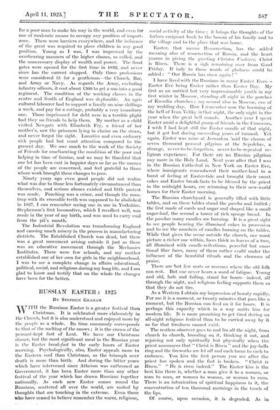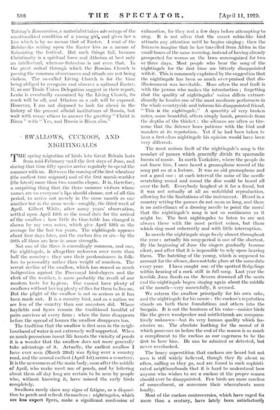RUSSIAN EASTER : 1925
BY STEPHEN GRAHAM WITH the Russians Easter is a greater festival than Christmas. It is celebrated more elaborately in the Church, but it is also understood and enjoyed more by the people as a whole. Its time commonly corresponds to that of the melting of the snows ; it is the crown of the peasant-kept fast of Lent. We have our Christmas dinner, but the most significant meal in the Russian year is the Easter break-fast in the early hours of Easter morning. Psychologically, also, Easter appeals more to the Eastern soul than Christmas, as the triumph over death is more than birth. And during the bitter years which have intervened since Atheism was enthroned as Government, it has been Easter more than any other festival of the year which has drawn Russians together nationally. As each new Easter comes round the Russians, scattered all over the world, are united by thoughts that are touching in the extreme. Even those who• have ceased to believe "remember the warm, religious, social activity of the time ; it brings the thoughts of the forlorn emigrant back to the bosom of his family and .to the village and to the place that was home.
Easter, that means Resurrection, has the added meaning also of resurrection of Russia, and the heart yearns in giving the greeting Christos Voskrece, Christ is Risen. There is a sigh remaining over from Good Friday. If only to those words of gladness could be added : " Our Russia has risen again ! "
I have lived with the Russians in many Easter Eves— Easter Eve being Easter rather than Easter Day. My first as an untried but very impressionable youth in my first winter in Moscow, standing all night in the porches of Kremlin churches ; my second also in Moscow, eve of my wedding day. How I remember now the booming of the bell of Ivan Ycliky in that night, the only night in the year when the great bell sounds. Another year I spent Easter amid a delightful group of friends in the Caucasus. I wish I had kept still the Easter candle of that night, but it got lost during succeeding years of turmoil. Yet again, -Easter was mine at Jerusalem 'mid the chorus of seven thousand peasant pilgrims at the Sepulchre, a strange, never-to-be-forgotten, never-to-be-repeated re- ligious experience. For there arc no Russian pilgrims any more in the Holy Land. Next year after that I was in the Russian Cathedral in New York on Easter Eve, where immigrants remembered their mother-land in a burst of feeling at Easter-tide and brought their sweet cakes and Easter break-fasts to be blessed by the priest in the midnight hours, ere returning to their new-world homes for their Easter morning.
The Russian churchyard is generally filled with little tables, and on these tables stand the pascha and kulitch the first made of curds and sugar and shaped like a small sugar-loaf, the second a tower of rich sponge bread. In the paschas many candles are burning. -It is a great sight to see people bearing the illumined cakes in procession and to see the numbers of candles burning on the tables.
While that gives the scene outside the church, one must picture a richer one within, faces thick as leaves of a tree, all illumined with candle-reflections, peaceful but emo- tional Slav faces, many of them rather exalte under the influence of the beautiful rituals and the choruses of praise.
There are 'but few seats or recesses where the old folk can rest. But one never hears a word of fatigue. Young and old, hale and failing, stand for hours--indeed, all through the night, and religious feeling supports them so that they do not tire.
As a Western I obtain my impression of beauty rapidly. For me it is a moment, or twenty minutes that pass like a moment, but the Russian can feed on it for hours. It is perhaps this capacity which in a way unfits him for modern life. It is more promising to get tired during an all-night religious festival than to be carried away by it so far that tiredness cannot exist.
The restless observer goes to and fro all the night, from church to church, brooding on it, thinking it out, and rejoicing not only spiritually but physically when the priest announces that " Christ is Risen " and the joy-bells ring and the fireworks are let off and each turns to each to embrace. You kiss the first person you see after the priest has spoken and the fast is broken. " Christ is Risen." " He is risen indeed." The Easter kiss is the best kiss there is, whether a man give it to a woman, or man to man, or woman to woman, or woman to man. There is an intoxication of spiritual happiness in it, the concentration of ten thousand mornings in the touch of the lips.
Of course, upon occasion, it is degraded. As in Tolstoy's Resurrection, a materialist takes advantage of the emotionalized condition of a young girl, and gives her a kiss which is by no means that of Easter. I read of the Bolsheviks seizing upon the Easter kiss as a means of Satanizing the festival. But such things fail, because Christianity is a spiritual force and Atheism at best only an intellectual, whereas• Satanism is not even that. In the great ordeal through which the Russian Church is passing the common observances and rituals are not being shaken. The so-called Living Church is for the time being obliged to recognize and observe a national Easter. If, as our Trade Union Delegation suggest in their report, Lenin is eventually canonized by the Living Church, its mask will be off, and Atheism as a cult will be exposed. However, I am not disposed to look far ahead in the history of the present official institutions of Russia, but wait with many others to answer the greeting " Christ is Risen " with " Yes, and Russia is Risen also."











































 Previous page
Previous page